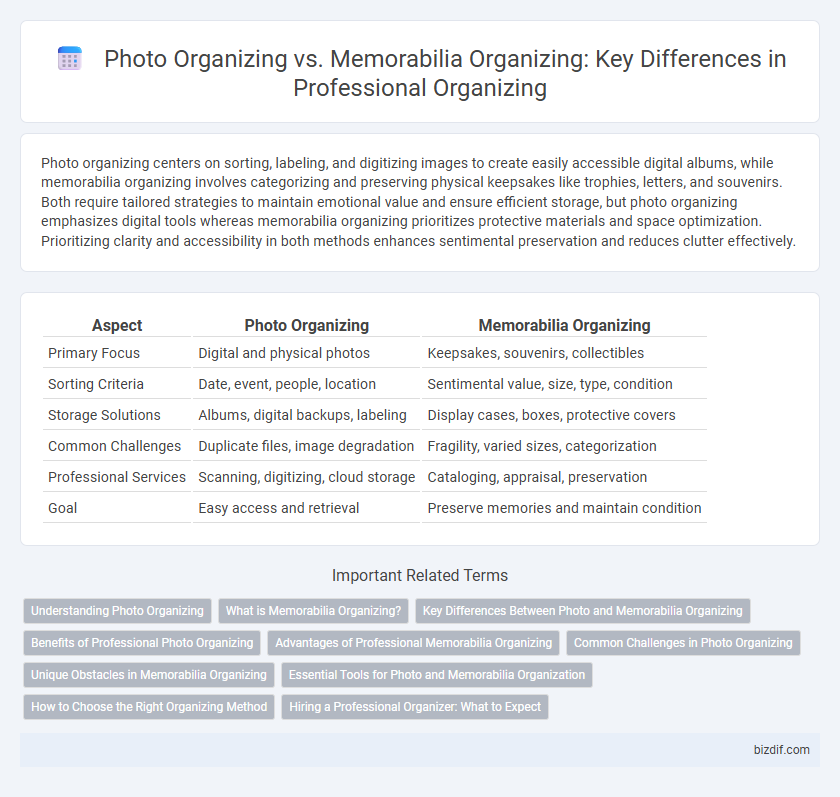Photo organizing centers on sorting, labeling, and digitizing images to create easily accessible digital albums, while memorabilia organizing involves categorizing and preserving physical keepsakes like trophies, letters, and souvenirs. Both require tailored strategies to maintain emotional value and ensure efficient storage, but photo organizing emphasizes digital tools whereas memorabilia organizing prioritizes protective materials and space optimization. Prioritizing clarity and accessibility in both methods enhances sentimental preservation and reduces clutter effectively.
Table of Comparison
| Aspect | Photo Organizing | Memorabilia Organizing |
|---|---|---|
| Primary Focus | Digital and physical photos | Keepsakes, souvenirs, collectibles |
| Sorting Criteria | Date, event, people, location | Sentimental value, size, type, condition |
| Storage Solutions | Albums, digital backups, labeling | Display cases, boxes, protective covers |
| Common Challenges | Duplicate files, image degradation | Fragility, varied sizes, categorization |
| Professional Services | Scanning, digitizing, cloud storage | Cataloging, appraisal, preservation |
| Goal | Easy access and retrieval | Preserve memories and maintain condition |
Understanding Photo Organizing
Photo organizing involves systematically sorting, categorizing, and preserving digital and physical images to enhance accessibility and protect memories, whereas memorabilia organizing focuses on managing tangible keepsakes like souvenirs and awards. Effective photo organizing requires thoughtful tagging, chronological arrangement, and digital backup strategies to prevent loss and ensure easy retrieval. Utilizing specialized software and cloud storage solutions further streamlines photo organization by enabling efficient searching and sharing of memories.
What is Memorabilia Organizing?
Memorabilia organizing involves categorizing and preserving sentimental items such as awards, souvenirs, letters, and keepsakes to maintain their condition and emotional value. Unlike photo organizing, which primarily focuses on sorting and digitizing images, memorabilia organizing requires specialized techniques to handle diverse materials and fragile objects. Professional organizers use archival-quality storage solutions and detailed labeling to create accessible, long-lasting collections that honor personal histories.
Key Differences Between Photo and Memorabilia Organizing
Photo organizing involves sorting, digitizing, and categorizing images based on events, dates, and people, emphasizing file formats and metadata management. Memorabilia organizing requires careful handling of physical items such as trophies, letters, and souvenirs, prioritizing preservation techniques and display solutions. The key difference lies in photo organizing's digital focus versus memorabilia organizing's emphasis on physical conservation and spatial arrangement.
Benefits of Professional Photo Organizing
Professional photo organizing preserves precious memories by creating accessible, well-categorized digital or physical archives that reduce clutter and prevent loss or damage. By using expert techniques, photos are sorted chronologically, thematically, or by event, enhancing retrieval efficiency and emotional connection. This service also offers personalized backup solutions, ensuring long-term preservation against accidental deletion or deterioration.
Advantages of Professional Memorabilia Organizing
Professional memorabilia organizing offers a specialized approach that preserves the sentimental value and historical significance of items while ensuring their long-term protection through appropriate storage solutions. Experts use archival-quality materials to prevent damage and deterioration, which is crucial for fragile or rare collectibles. This tailored service also creates a cohesive, accessible display or archive, making it easier to share memories and maintain family heritage over time.
Common Challenges in Photo Organizing
Photo organizing commonly involves sorting thousands of digital and printed images, often complicated by duplicates, varying file formats, and incomplete metadata. Metadata inconsistencies and lack of proper tagging make search and retrieval time-consuming and frustrating. Unlike memorabilia organizing, which deals with diverse physical items, photo organizing demands efficient digital tools and strategies to manage large volumes of intangible assets effectively.
Unique Obstacles in Memorabilia Organizing
Memorabilia organizing presents unique obstacles such as preserving fragile materials, managing emotional attachments, and cataloging diverse item types ranging from heirlooms to event souvenirs. Unlike photo organizing, which primarily involves digital and physical images, memorabilia requires specialized storage solutions to prevent damage and ensure longevity. Effective memorabilia organization demands tailored strategies that balance careful handling with meaningful classification to honor personal histories.
Essential Tools for Photo and Memorabilia Organization
Essential tools for photo organizing include high-quality archival sleeves, acid-free photo boxes, and digital scanning devices to preserve and digitize images effectively. Memorabilia organizing requires sturdy storage bins, labeled dividers, and protective padding materials to safeguard fragile items like trophies, letters, and keepsakes. Both approaches benefit from detailed inventory apps and customizable labeling systems to ensure easy access and long-term preservation.
How to Choose the Right Organizing Method
Choosing the right organizing method depends on the unique characteristics of photos versus memorabilia. Photos benefit from digital scanning and categorization by date or event to enhance accessibility and preservation. Memorabilia requires customized storage solutions that protect fragile items and group them by theme or significance to maintain their sentimental value.
Hiring a Professional Organizer: What to Expect
Hiring a professional organizer for photo organizing involves meticulous digital and physical categorization, ensuring easy access and preservation of memories through high-quality scanning and labeling techniques. Memorabilia organizing requires specialized handling to protect fragile items like trophies, letters, and heirlooms, often incorporating custom storage solutions tailored to individual collections. Expect thorough consultations to assess your unique needs, personalized strategies for sorting and display, and guidance on maintaining organized spaces that honor your personal history.
photo organizing vs memorabilia organizing Infographic

 bizdif.com
bizdif.com